The war in Ukraine has now reached an inflection point, according to a prominent observer. The United States must decide whether it will help Ukraine approach the negotiating table with as much leverage as it can or watch Russia reorganize and resupply its troops, adapt its tactics, and commit to a long-term war of attrition, argues Alexander Vindman, a Senior Fellow at the Johns Hopkins School of Advanced International Studies Foreign Policy Institute.
If Ukrainian democracy is going to prevail, foreign policymakers must finally prioritize dealing with Ukraine as it is rather than Russia as they would like it to be, he writes for Foreign Affairs:
The Biden administration has made democratic renewal a cornerstone of its domestic and foreign policy agendas. There is no better way to demonstrate democratic resolve than by defending U.S. values and interests in Ukraine. A Ukrainian victory would not only limit Russia’s capacity for future military aggression but also cement democracy’s foothold in Eastern Europe, offering a powerful lesson to would-be authoritarian aggressors and democratic nations alike. A Ukrainian loss, by contrast, would signal an acceleration of the wave of authoritarianism and democratic decline that has washed over the globe in the last decade.

The time when incremental support was sufficient has passed. Ukraine’s needs are known, several leading analysts suggest. The United States needs to lead an allied surge to provide a massive U.S. and allied heavy weaponry support package to Kyiv while the Ukrainian military is able to further degrade the Russian forces, say former deputy secretary of state Stephen E. Biegun, the Center for Strategic and Budgetary Assessments’ Eric S. Edelman, former deputy assistant secretary of defense Daniel Fata and David J. Kramer, director for global policy at the George W. Bush Institute and former assistant secretary of state for democracy, human rights & labor.
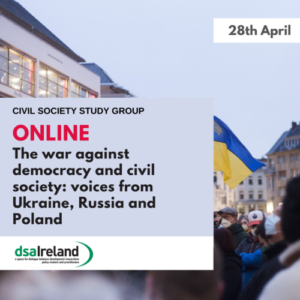 The sooner we can help Ukraine defeat the Russian military, the sooner the killing of innocent Ukrainians will come to an end. The sooner that happens, the safer other parts of Europe at risk of Russian aggression will be. And then, perhaps, Putin’s grip on power might be challenged, which would be a welcome relief for many Russians who have suffered under his increasingly fascist rule, they write for The Bulwark:
The sooner we can help Ukraine defeat the Russian military, the sooner the killing of innocent Ukrainians will come to an end. The sooner that happens, the safer other parts of Europe at risk of Russian aggression will be. And then, perhaps, Putin’s grip on power might be challenged, which would be a welcome relief for many Russians who have suffered under his increasingly fascist rule, they write for The Bulwark:
We also need to ratchet up our sanctions on Russia and close any loopholes that enable evasion by Russian banks or oligarchs. The sanctions that already have been imposed have had a major effect on the Russian economy, leading to layoffs and shortages. The Russian ruble, which has strengthened since its dive after the February invasion, has more recently swung wildly in value as Russia’s macroeconomic band-aids start to peel off and long-term economic uncertainty returns. Europe needs to accelerate its plans to reduce its dependence on Russian energy, still an important source of revenue for Putin. Together with serious military assistance for Ukraine, tougher economic sanctions on Putin and his regime will weaken Russia’s ability to carry out its aggression against Ukraine.
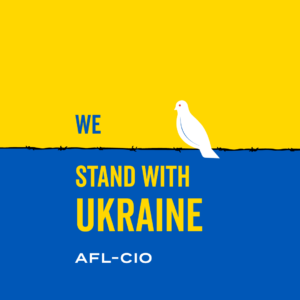
Democracies are today at a disadvantage vis-à-vis the Russian-Chinese totalitarian axis, and it isn’t because the West lacks the money or material resources to confront them and prevail. Rather, much like in the late 1930s, the West doesn’t believe that the threat is real, argues Andrew Michta, dean of the College of International and Security Studies at the George C. Marshall European Center for Security Studies in Garmisch, Germany.
Historically democracies have been unbeatable when united around a common purpose. Until the West’s disbelief is replaced by a determination to resist, the Russian and Chinese dictators will keep pressing on, planning their major assaults and dreaming of future victories, he writes for The Wall Street Journal.
Russian occupation officials may be accelerating their preparations for illegitimate pseudo-referenda on the Kremlin’s annexation of occupied Ukrainian territory, the Institute for the Study of War reports.
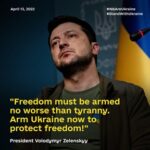 Early after Russia invaded Ukraine, many Russian journalists and Western technology executives said they expected YouTube to be banned, because the government was blocking thousands of websites with content that challenged Moscow’s propaganda. Now Western media experts say the Kremlin may deem YouTube too popular to block, The Journal adds.
Early after Russia invaded Ukraine, many Russian journalists and Western technology executives said they expected YouTube to be banned, because the government was blocking thousands of websites with content that challenged Moscow’s propaganda. Now Western media experts say the Kremlin may deem YouTube too popular to block, The Journal adds.
“Some banks are too big to fail, and some apps are too big to be blocked,” said Nu Wexler, a former policy communications staffer at Google, Meta and Twitter. “The Russian government knows they would face a backlash if they were to block a popular app like YouTube.”

Levada
The video site was used by 47% of a sample of Russians surveyed in April by the independent Russian pollster Levada Center, making it the country’s second-most popular social network behind local service VKontakte, the Journal adds.
Russia’s exhaustion is Ukraine’s opportunity, adds Forbes analyst David Axe. The Ukrainian 17th Tank Brigade and other units in May launched a slow counteroffensive toward occupied Kherson on the Black Sea coast, taking advantage of the relative paucity of Russian forces in the area.
Retired Australian army general Mick Ryan describes Ukraine’s strategy as one of “corrosion.” “This strategy of corrosion sees Ukraine attacking the Russians where they are weak.”
The Kremlin is attempting to erase Ukraine’s culture, history and identity in cities where its forces have advanced through bombing and targeted attacks, reports suggest. Russian President Vladimir Putin and senior Russian officials continue to spread disinformation, claiming that Ukraine is part of Russia, and they seek to remove all symbols of Ukrainian culture forcibly. In Borodyanka, the bust of revered Ukrainian poet and patriot Taras Shevchenko is a highly visible example of site damage — and Russian hostility.
“The symbolism of the Russian attack on the monument was obvious,” Stephen M. Norris, a history professor at Miami University of Ohio, wrote. “Taras Shevchenko is not just the founder of the modern Ukrainian literary language, he is also the most important symbol of modern Ukrainian nationhood.”
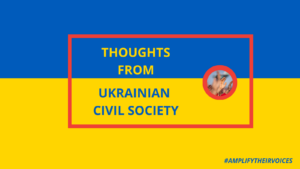 According to Ukrainian officials, more than 10,000 allegations of war crimes are being investigated by a multinational team, including dozens of representatives from the International Criminal Court, yet sorting through the atrocities of Mariupol, Bucha, and other cities across the country proves challenging and time-consuming, the National Endowment for Democracy (NED) adds. The Center for Civil Liberties (CCL – above) —one of Ukraine’s leading human rights organizations and a 2022 NED Democracy Award honoree—joins the important effort to monitor and document war crimes and crimes against humanity, seeking justice for victims and helping the country move forward.
According to Ukrainian officials, more than 10,000 allegations of war crimes are being investigated by a multinational team, including dozens of representatives from the International Criminal Court, yet sorting through the atrocities of Mariupol, Bucha, and other cities across the country proves challenging and time-consuming, the National Endowment for Democracy (NED) adds. The Center for Civil Liberties (CCL – above) —one of Ukraine’s leading human rights organizations and a 2022 NED Democracy Award honoree—joins the important effort to monitor and document war crimes and crimes against humanity, seeking justice for victims and helping the country move forward.
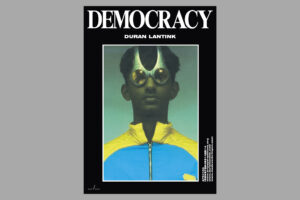 When releasing this poster (right) in January together with the publication ‘Democracy’, Duran Lantink, APE and Galerie Madé van Krimpen never realized how relevant it would become, they write. That is why they decided to reprint and launch the poster in a special sale from which all proceeds will support those affected by the devastating crisis in Ukraine. To get your poster you can order online here or buy it at Galerie Madé van Krimpen, Prinsengracht 615H, Amsterdam (all proceeds go to the Red Cross).
When releasing this poster (right) in January together with the publication ‘Democracy’, Duran Lantink, APE and Galerie Madé van Krimpen never realized how relevant it would become, they write. That is why they decided to reprint and launch the poster in a special sale from which all proceeds will support those affected by the devastating crisis in Ukraine. To get your poster you can order online here or buy it at Galerie Madé van Krimpen, Prinsengracht 615H, Amsterdam (all proceeds go to the Red Cross).
Click here to see ISW’s interactive map of the Russian invasion of Ukraine. This map is updated daily alongside the static maps present in this report.
Ukrainian victory would not only limit Russia’s capacity for future military aggression but also cement democracy’s foothold in Eastern Europe, offering a powerful lesson to would-be authoritarian aggressors, @AVindman writes via @ForeignAffairs https://t.co/klgjgb7sj5
— Democracy Digest (@demdigest) August 8, 2022







